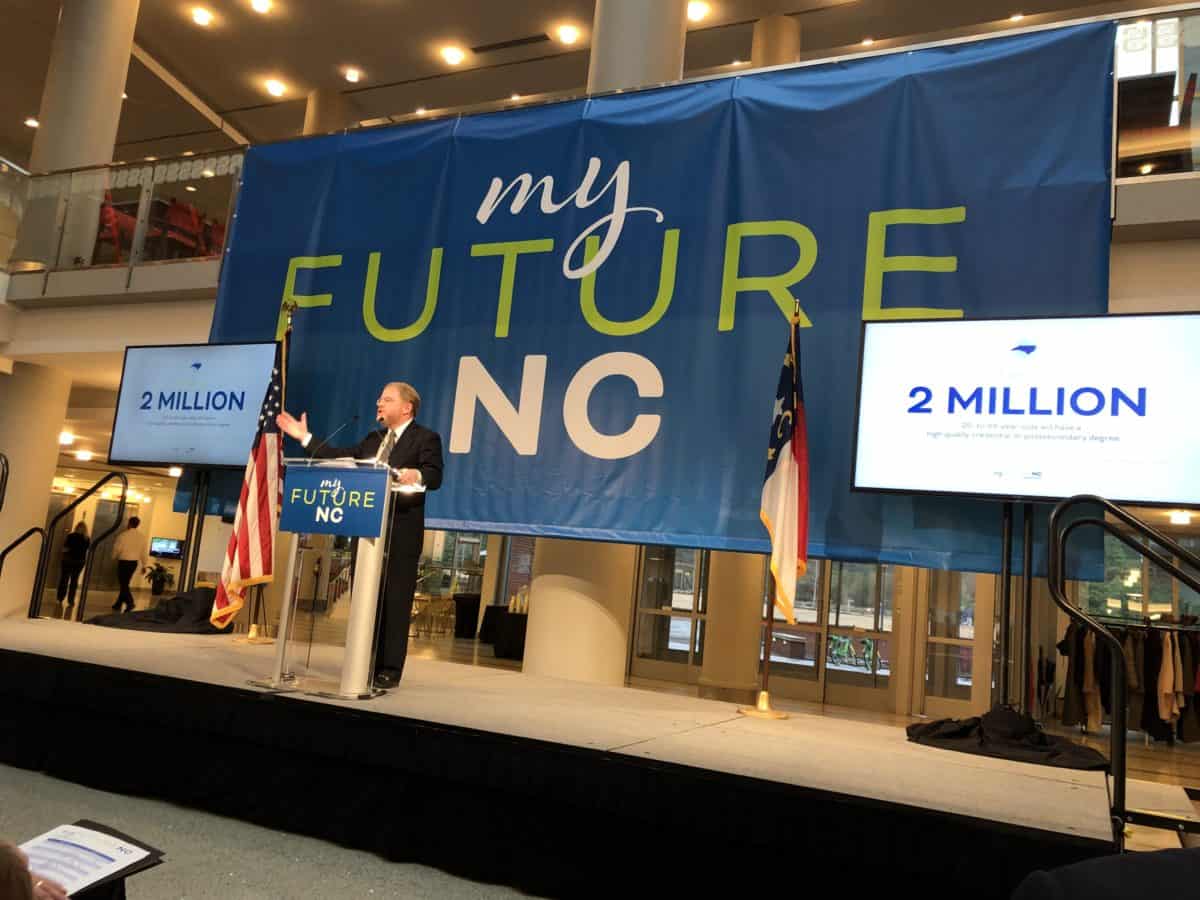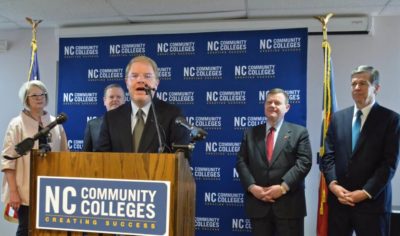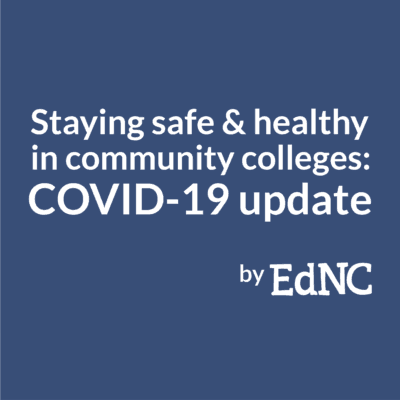
Peter Hans was announced as president-elect of the University of North Carolina System after the UNC Board of Governors approved his selection on Friday, June 19. Hans will assume the role on August 1. Hans has served as president of the North Carolina Community College System since May of 2018.
Hans’ departure will spark yet another presidential search for the system during a complex time for the state’s 58 community colleges as they wrestle with COVID-19 and potential implications for funding due to state revenue shortfalls.
EdNC hosted a webinar earlier in the week on the crucial decisions facing our community colleges that laid out some of the larger debates.
“We have received 7% to 9% of the total educational dollar allocation every single year since our birth,” Garrett Hinshaw, president of Catawba Valley Community College, said during the webinar. “And when you look at the impact that we’re having on our local communities, and on our workforce, the return on the investment of that has been tremendous. Imagine if we only received 10% to 11%, instead of just the seven to nine, the difference that we can make in our communities.
“And we have this idea that we have to continue to accept status quo; we have all changed. We have changed in this moment, and I believe there is an appetite from the decision makers,” continued Hinshaw. “I’ve spoken directly to the governor about this issue, and I’ve talked to the House and Senate leaders. It is now that these critical conversations must start about the investment that North Carolina makes in education.”
Breeden Blackwell, chair of the State Board of Community Colleges, said, “Our community colleges are stronger because of Peter Hans. He led our system with energy and vision. In the past year alone, we have seen a critical new infusion of state funding and the first enrollment increase in nearly a decade. Our Board will meet soon to discuss next steps as we begin to think about an interim president and the search for our next leader.”
The system has had four different leaders in the past five years. Scott Ralls was president of the system office from 2008 until 2015. The system has since had two full-time presidents — Jimmie Williamson from 2016 to 2017, and Hans since May 2018. The system has been led by two interim presidents as well — George Founts (2015-2016) and Jennifer Haygood (2017-2018). Haygood now serves as chief of staff and executive vice president of the system.
Ralls, now president of Wake Technical Community College, said, “Peter is a leader who uniquely understands North Carolina, who uniquely understands higher education, and who knows the unique impact that higher education has had on the economic trajectory of our state. I’ve always appreciated working with Peter in his previous roles, and while we will miss him greatly in the community college system, we all look forward to partnering with him in this important new role.”
Hans, who was the ninth president of the NC Community College System, brought to bear an array of experience in higher education, including a six-year term on the State Board of Community Colleges and three terms on the UNC Board of Governors. He served as chair of the UNC Board for two years.
“Public education has been the cornerstone of my life and helped shape my years of public service,” said Hans in a press release distributed by the UNC System. “My goal is to make higher education more affordable for more North Carolinians so we can extend opportunity to all of her citizens.”
In a rare show of solidarity, Gov. Roy Cooper, Senate President Pro Tempore Phil Berger, R-Rockingham, and House Speaker Tim Moore, R-Cleveland, released a statement in support of Hans’ selection, saying, “Peter Hans has done tremendous work as president of the N.C. Community College System, and he’s the right choice for UNC System President. That we all agree on Peter is a testament to the respect he commands as an able, competent leader.”
Hans is also co-chair of myFutureNC, a nonprofit made up of education, business, and nonprofit leaders who are pushing a statewide attainment goal for North Carolina — 2 million residents with a high-quality postsecondary degree or credential by 2030.
Bill McBrayer, a member of the State Board of Community Colleges, issued a statement following a conversation with Hans on the future of the community college system and Hans’ role. McBrayer’s statement read in part, “The president assured me that he would continue to be an advocate for community colleges, and would ensure that North Carolina students have a smooth transition from community colleges to universities.”
Former Lt. Gov. Walter Dalton, president of Isothermal Community College, said, “Peter has taken the helm of the North Carolina Community College System and has performed admirably. I am sure he will do the same as he leads the university system. He has the respect of the community college presidents and all who work with him.”
Several community college leaders we spoke with expressed strong feelings about the need for stable leadership, as well as a longer tenure from the system’s next head.
Hinshaw couched his thoughts in the need facing the system and the state during the current pandemic.
“Our community college system is at a pivotal moment in its history,” Hinshaw said. “Our role in the continuum of education in this state has changed dramatically, and we must identify a system president that understands the value and opportunities we have in our role to help NC’s economy and its citizens recover.”
Kandi Deitemeyer, president of Central Piedmont Community College, expressed similar sentiments. Deitemeyer told us, “As we move forward as a system, we need a solid and committed leader who understands North Carolina and the mission of our astounding community college system. Since 2015, we have had four leaders at the helm of the system. Stability in leadership is imperative as we navigate the changing marketplace of higher education and ensure our 58 colleges remain strong and responsive.
“We have much to accomplish for so many in our state. I hope we will look for a servant leader, who understands the diverse needs of our communities and students we serve, and who can champion the story of community colleges and our collective impact as North Carolina’s economic driver for workforce development.”
EdNC will cover the selection process as it unfolds.




